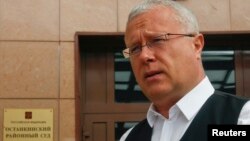MOSCOW —
Russian billionaire Alexander Lebedev has pleaded not guilty to charges of hooliganism motivated by political hatred. Lebedev says that he is being targeted by Russian President Vladimir Putin because Putin believes he is funding the opposition.
Alexander Lebedev, co-owner of Novaya Gazeta, Russia's leading opposition newspaper, went on trial Monday in a Moscow court. Lebedev faces charges of hooliganism motivated by political hatred for punching a Russian businessman and property developer, Sergei Polonsky, during a television talk show in 2011.
Lebedev denies the charges. He said he doesn't think he's guilty and doesn't understand the charges against him. Lebedev said he was not motivated by hooliganism or political hatred because he didn't know the defendant.
Polonsky was not at the trial because he is being held in Cambodia in an unrelated criminal case.
The two were guests on a TV talk show in September 2011 when Lebedev jumped out of his chair and started punching Polonsky after Polonsky teased him. Polonsky was knocked off the studio's podium.
Lebedev says he believes he's now facing the charges of hooliganism, which carries a sentence of up to seven years in prison, because Putin thinks he's financing the opposition. Lebedev denies the claim.
Hooliganism is a term applied broadly in Russia, frequently covering behavior that is not deemed appropriate by the Kremlin or not specifically defined by law.
Lebedev is the latest to face hooliganism charges. Members of the all-female punk band, Pussy Riot, were charged with hooliganism motivated by religious hatred after staging an anti-Putin protest on the altar of Russia's most prominent Orthodox cathedral. Two band members were sentenced to two-year prison terms in penal colonies.
Putin returned to the Kremlin for a third term in May of 2012 and has faced unprecedented opposition demonstrations.
The opposition claims Putin won the country's December 2011 parliamentary elections through vote rigging and ballot stuffing. Demonstrators also say Putin runs the country through a tightly controlled political system and corruption. The Kremlin denies all of the charges.
Since the demonstrations, the Kremlin has launched a major crackdown on dissent. It has leveled criminal charges against members of the opposition, increased more than 150-fold the fines for participating in and organizing unsanctioned protests, required non-governmental organizations that received foreign funding to register as foreign agents, and forced the United States Agency for International Development to end its presence in Russia after 20 years there.
The Kremlin has consistently maintained that it is not trying to quash the opposition, but simply enforcing the law and making Russia a safe place for all.
Alexander Lebedev, co-owner of Novaya Gazeta, Russia's leading opposition newspaper, went on trial Monday in a Moscow court. Lebedev faces charges of hooliganism motivated by political hatred for punching a Russian businessman and property developer, Sergei Polonsky, during a television talk show in 2011.
Lebedev denies the charges. He said he doesn't think he's guilty and doesn't understand the charges against him. Lebedev said he was not motivated by hooliganism or political hatred because he didn't know the defendant.
Polonsky was not at the trial because he is being held in Cambodia in an unrelated criminal case.
The two were guests on a TV talk show in September 2011 when Lebedev jumped out of his chair and started punching Polonsky after Polonsky teased him. Polonsky was knocked off the studio's podium.
Lebedev says he believes he's now facing the charges of hooliganism, which carries a sentence of up to seven years in prison, because Putin thinks he's financing the opposition. Lebedev denies the claim.
Hooliganism is a term applied broadly in Russia, frequently covering behavior that is not deemed appropriate by the Kremlin or not specifically defined by law.
Lebedev is the latest to face hooliganism charges. Members of the all-female punk band, Pussy Riot, were charged with hooliganism motivated by religious hatred after staging an anti-Putin protest on the altar of Russia's most prominent Orthodox cathedral. Two band members were sentenced to two-year prison terms in penal colonies.
Putin returned to the Kremlin for a third term in May of 2012 and has faced unprecedented opposition demonstrations.
The opposition claims Putin won the country's December 2011 parliamentary elections through vote rigging and ballot stuffing. Demonstrators also say Putin runs the country through a tightly controlled political system and corruption. The Kremlin denies all of the charges.
Since the demonstrations, the Kremlin has launched a major crackdown on dissent. It has leveled criminal charges against members of the opposition, increased more than 150-fold the fines for participating in and organizing unsanctioned protests, required non-governmental organizations that received foreign funding to register as foreign agents, and forced the United States Agency for International Development to end its presence in Russia after 20 years there.
The Kremlin has consistently maintained that it is not trying to quash the opposition, but simply enforcing the law and making Russia a safe place for all.




